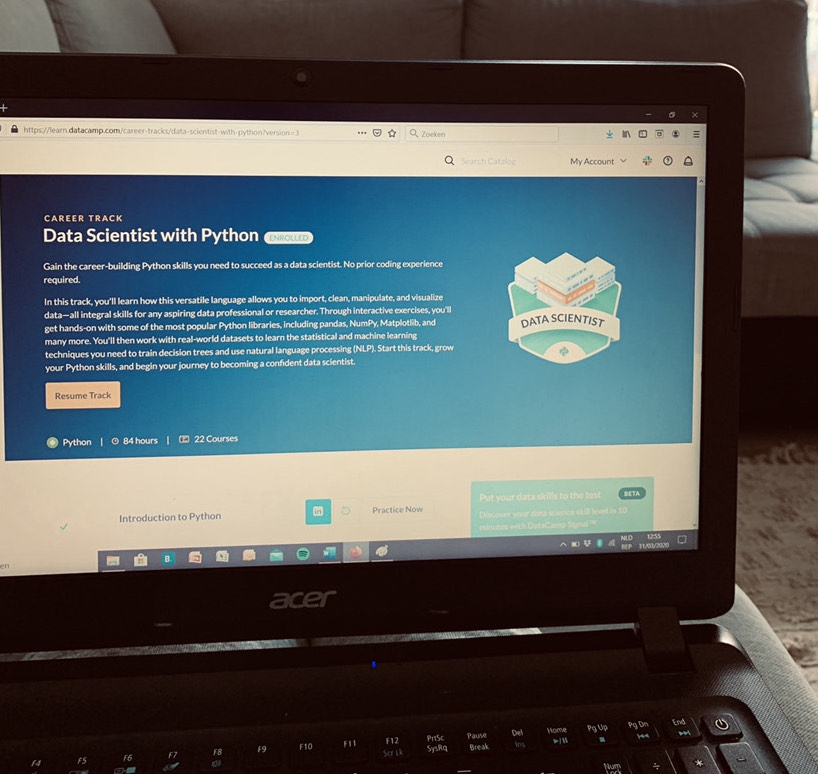
I’m Laura Vangenechten, a second year Master’s student in Biochemistry & Biotechnology. My fellow students and I have been looking forward to the year 2020, as this will be the year that we will finally finish our degree course and graduate. University classes had only been ongoing for a few weeks and we were busy thinking about and planning our future careers. Then, at the beginning of March, our prospects were suddenly interrupted, as Belgium became affected by a new virus called COVID-19. This virus caused our entire university and country to shut down and it was unclear what was going to happen next.
At first, it seemed that the Coronavirus would not affect our lives in Belgium. But, before we knew it, this virus had spread all over the world and it managed to bring the whole world to a stand-still. Countries had to make drastic decisions, such as shutting down entire cities to slow down the spread of the virus. Another way to slow this down was by closing schools and universities all around the world and to shift to online learning. It didn’t take long before UAntwerp also had to take the same measures. The fight against the Coronavirus outbreak created a lot of uncertainties for all the students, because we didn’t know what was going to happen with regard to our studies. This resulted in a lot of questions: Can we resume our internships? Can we still graduate in June? What about our courses, practical classes, assignments, exams? Our questions were soon answered efficiently by UAntwerp, and it became clear that online education would be the new method for education for the rest of this academic year.
So, for the foreseeable future, we’ll all be on a COVID-19 enforced lockdown. And thus, we’re left with a lot of extra, unplanned time at home. If you need to stay at home for a long period of time, it’s important to remain intellectually active and stay motivated. Otherwise, you can lose track of hours, or even days, binge-watching your favorite Netflix series. If you’re into sports, then you can livestream many different online exercise classes. You can even stream virtual concerts from your own room, or you can learn how to cook new and exotic recipes! It is ofcourse also possible to do absolutely nothing. The latter may sound like music to your ears, but wouldn’t it be better to do something more meaningful with this self-isolation time? It is ofcourse important to relax and stay physically active as our mental health can be affected during these difficult Corona times. But I think it’s also important to get the most out of this enforced lockdown and to improve yourself.
You can use a few hours a day to enhance your skills, learn new things and upgrade your resume. For example, if you’re interested in working abroad, you could start learning a new language. There are lots of ways of learning a new language or for brushing up on your language skills, ranging from online classes to language apps such as Duolingo. Also, as technology is rapidly evolving and changing all the time, it’s also useful to spend some time to upgrade your computer skills. There are many different online courses you can do where you can follow tutorials at your own pace.

During my internship in Prof. Stuart Maudsley’s lab, I was working on a G protein-coupled receptor (GPCR) called RXFP3 and how this GPCR can be therapeutically controled in aging. We were collecting large amounts of data in the lab and I needed a better way of analyzing and processing this data. The best way to do this would be to use a programming language to write algorithms to process the data. So, now that I have more time during the lockdown, I’ve been learning the programming language ‘Python’. Python is used in almost every industry and is one of the easiest programming languages to master. Here’s an interesting fact: Python’s name is derived from the British comedy group Monty Python, whom Python creator Guido van Rossum enjoyed while developing the programming language. Monty Python references frequently appear in Python computer code and culture.
Ofcourse, programming isn’t for everyone. It took me a week to convince myself to follow an online course. To follow a course offered by datacamp, no prior coding experience is required. You can choose which programming language you would like to learn (Python, R …) and subsequently you can choose a course that fits your learning needs. You can gain experience in data visualization, data cleaning and even machine learning techniques. You can also choose to start with a ‘Career Track’. This consists of different courses and allows you to develop yourself as a real data scientist. I’m following the career track called ‘Data scientist with Python’ that consists of 22 courses. It contains 84 hours of online learning, so I’ll be keeping myself busy for the next few weeks! But as one of the advantages of this lockdown is that you can work from your sofa in your pyjamas, it doesn’t feel like hard work. Even if learning a new language or programming isn’t for you, there are many other ways to expand your skills. I think that it is important to stay motivated during these Corona times and to use this time to develop additional skills that will help with your future career progression. So, be bold, and have a go at learning something completely new!
Article written by Laura Vangenechten. Student editor: Jolien Hendrix. Editor: Dr. Bronwen Martin
